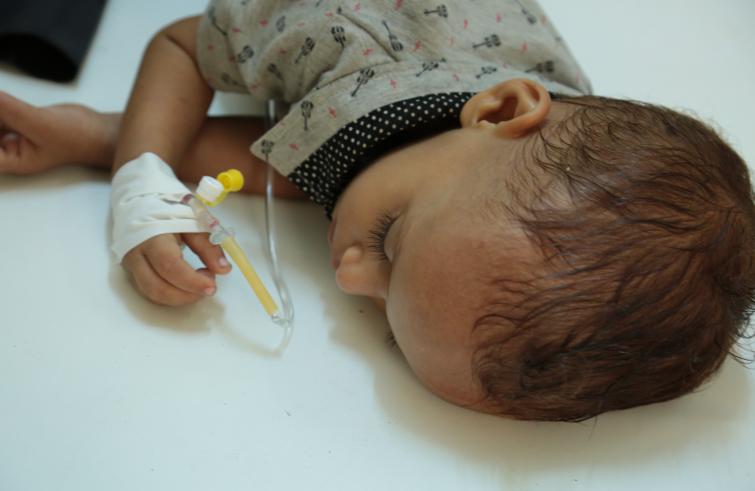
“The most heart-rending episodes involved undernourished children devastated by cholera.” Maria Rita Ceccaroni, humanitarian worker for Save the children, can’t remove those tragic scenes from her eyes and her heart. She spent six months in Yemen and came back a short while ago. “Moisturizing minerals and high protein food would be enough to save them – she said– but in this devastating war it’s extremely difficult to deliver humanitarian aids, especially to remote areas.” Three years since the outbreak of the conflict between pro-government forces backed by the Saudi Arabia-led coalition, and the Shiite Houthi rebels, the situation is “apocalyptic”, Ceccaroni said. “In some cases it’s horrendous”: a man made tragedy that is even more dramatic owing to the utter lack of concern on the part of mainstream media outlets and international public opinion. Moreoever, some Western countries have a great share of responsibility, Italy included, in the sale of weapons. In fact – as documented by several organizations – bombs produced in the Rwm Italy Ltd. factory in Domusnovas, Sardinia (owned by a German industrial group) continue being shipped to Saudi Arabia.
These terrible figures should arouse indignation. It’s absurd that the figures, released by international organizations on a regular basis, fail to arouse a wave of indignation at global level: data published in February 2018 at the Office of the High Commissioner for Human Rights of the United Nations indicate at least 5,974 civilians killed (including thousands of children) and another 9,493 injured.
Save the children made known that every day 5 children are injured or killed. More than 22 million people need humanitarian assistance.
One million people have contracted cholera, and there has recently been an outbreak of diphtheria. Two million are internally displaced, 1.9 million children can’t go to school because the school buildings have been destroyed. As a result, boys there are exposed to the risk of forced recruitment into armed groups and girls into forced marriages. Over 15,000 airstrikes have been recorded since the start of hostilities. Even hospitals have been bombed.

“Disastrous” consequences for the population. “It’s a civil war with dynamics that resemble the situation in Syria: international powers are fighting for control of the territory – Ceccaroni said -. There are great geopolitical and economic interests at stake but the consequences at local level are dramatic.” Save the children, the organization engaged in the protection of children worldwide since 1919, has been present in Yemen for about thirty years. Its activity initially focused on the Country’s development but for the past three years all efforts were placed on facing the emergency situation caused by the conflict with the help of local staff operating throughout the territory in the distribution of highly nutritious foodstuffs, water and sanitation, health care, assistance to mothers and children.
Access denied to humanitarian assistance in the north of the country. “Humanitarian assistance can’t get into the northern areas where the consequences of the conflict are even harsher – Ceccaroni said – we too were denied humanitarian access.”
“This means sentencing to death a whole population.”
In addition to the check points that impede access, for a long time the Saudi-Arabia-led coalition closed down ports and airports, thereby preventing the delivery of humanitarian assistance, food, medicine and fuel. Although in December there was a partial lifting of the blockade, the monthly imports of fuel and food are below the needs of the population, while inflation is skyrocketing. On top of this, “there are frequent attacks claimed by ISIS. I witnessed it while I was in Aden – said the worker of Save the children -. The situation is extremely difficult.”
Damages also in the old city of Sana’a. In addition to the humanitarian tragedy of the local population there is the sadness of seeing one of the most beautiful countries in the world – notably the stunning architecture of the sand palaces in the capital Sana’a – devastated by bombs. “Not even the old city of Sana’a has been spared,” Ceccaroni bitterly remarked.
“Until political decision-makers enable unimpeded access of humanitarian aids and end all hostilities, people will continue dying of starvation, cholera and other diseases.”

In this situation even saving the life of a child is a small victory. “The Yemenite population is resilient – she said -. As often happens in situations of emergency or conflict, people discover their inner strength they were previously unaware of. They say: ‘We shall come through. And they move forward with courage and with a smile.”
Appeal to the new Italian parliament “stop the sale of weapons.” In the meantime, while waiting for the investigations and indictments for war crimes committed by both sides, and for the resumption of peace talks, on March 28 humanitarian organizations – Amnesty international Italy, Focolari Movement, Ethical Finance Foundation, Oxfam Italy, Rete della pace, Italian disarmament network– sent a joint appeal to the new Italian Parliament to “suspend exports of munitions and weapons that fuel the war in Yemen” and “request a UN-led peace initiative.” On 19 September 2017, with 301 votes against and 120 in favour, the Chamber of Deputies had already rejected a motion calling on the government to stop the sale of arms to countries at war or responsible for human rights violations.












